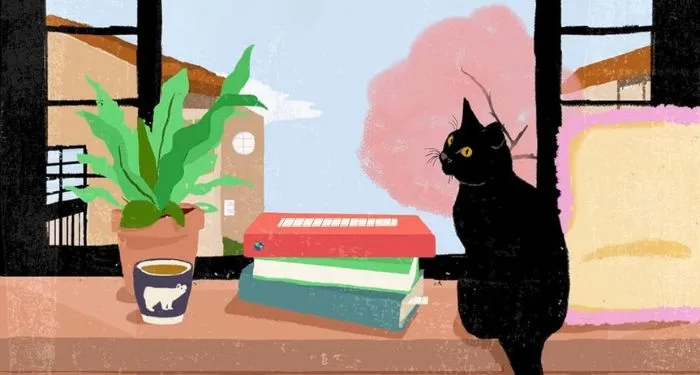I first saw Tangier in the summer of 2006. I was traveling in northern Morocco with my future husband, who is half Moroccan. On our arrival in Tangier we checked into El Muniria, a simple little hotel where William Burroughs wrote Naked Lunch. We could climb out the window of our room, sit on the red-tiled roof, and smoke joints—northern Morocco is well known for its copious production and consumption of hashish. If the day was clear, we could see Spain across the Strait of Gibraltar. Tangier still had a bad reputation then, though this, like almost everything else about it, turned out to be a half-truth. I was instantly seduced by the city’s stunning natural setting, its scruffiness, its whiff of freedom and its broken-down glamour. Of course, if I’d known more about its history, I would have realized that my enthusiasm was the most predictable reaction possible on the part of a young, hedonistic, literary Western visitor.
We had mint tea and split pea soup at Café Hafa, whose stepped terraces face the sea, and croissants and coffee at Café de Paris, whose mirrored walls multiply one’s views of passersby. We met Simon-Pierre Hamelin, the editor of the multilingual magazine Nejma, at the historic Librairie des Colonnes; we went to the Cinéma Rif, beautifully renovated by the artist Yto Barrada. We people-watched in the Grand Socco, an oval plaza that tilts at a rakish angle toward the entrance of the medina. One night an old man with a white beard and the handsome weather-beaten face of a sailor stepped out of a shady-looking hotel and declared, “Le vrai Tangier n’existe plus!”
Nostalgia hangs in the air in Tangier. The Moroccan writer Mohamed Choukri—one of the city’s great, scathing chroniclers—had no patience for it: “The lamentation over the mythical Tangier, the yearning for a Tangier that no longer exists, and by those who never even lived there, is the peak of absurdity.” Choukri loved Tangier but refused to romanticize it. His writing is a bracing corrective to the notion of the city as a glamorous, bohemian playground.
The mythical Tangier lasted from 1924 to 1956, when it became part of independent Morocco. During those decades the city and its environs were an international zone administered by Spain and France (which each controlled part of Morocco as a protectorate), the United Kingdom (which had an interest in the area because of its enclave in Gibraltar), the sultan of Morocco, and, after World War II, the United States, none of which had strong authority. This ambiguous arrangement made for a lawless, cosmopolitan place that drew spies, smugglers, money launderers, millionaires, con men, artists, bohemians, and Moroccan nationalists and agitators. Its social mores were reputed to be as lax as its banking regulations.
Tangier attracted many Western musicians, artists, and writers, whose presence contributed to its myth. In the 1930s they included Black American artists such as Josephine Baker and Claude McKay. In the 1950s it became a mecca for Beat writers like Burroughs, Allen Ginsberg, and Jack Kerouac. Susan Sontag, Tennessee Williams, Samuel Beckett, Francis Bacon, and Truman Capote visited. The Spanish writer Juan Goytisolo spent time there; Jean Genet lived there and was buried in the nearby town of Larache. In the 1970s the city had a lively musical scene: Randy Weston founded a jazz club called African Rhythms, and artists such as Ornette Coleman, Idrees Sulieman, and Herbie Mann performed in the city and composed music inspired by it and by Morocco’s rich musical tradition. The Master Musicians of Jajouka, a troupe that had performed their trancelike music, accentuated by the shrill notes of the ghaita horn, for centuries for the sultans of Morocco, were recruited by the painter Brion Gysin to play at his nightclub, the Thousand and One Nights; the Rolling Stones’ Brian Jones produced an album of their music.
The American artists often came by way of Paris. They thought of Tangier as an exotic haven from US racism, conformism, homophobia, or anticommunism; they could live cheaply and find easy access to drugs and sexual partners. Many were drawn by a connection to Paul Bowles, who had settled in Tangier in the late 1940s with his wife and fellow writer, Jane Bowles, and whose novels presented North Africa as a vivid, violent place where disaffected Westerners experienced both revelation and ruin.
In Paul Bowles’s excellent Tangier novel, Let It Come Down (1952), a fabulously wealthy Spanish aristocrat says,
It was one of the charms of the International Zone that you could get anything you wanted if you paid for it. Do anything, too, for that matter—there were no incorruptibles. It was only a question of price.
Burroughs claimed that “Tangier is one of the few places left in the world where, so long as you don’t proceed to robbery, violence, or some form of crude, antisocial behavior, you can do exactly what you want.” (More practically, he also observed, “In an altercation an American is automatically right against an Arab. I like that, and I don’t abuse it.”)
Choukri’s autobiographical tale For Bread Alone—set at the time of Tangier’s glory years—makes clear that the city’s freewheeling atmosphere sprang from a foundation of utter destitution. The personal liberties and easy living that its expatriate community enjoyed and romanticized were not available to most of its Arab population, whom the foreigners often looked down on with casual racism.
Choukri came to the city as a poor and illiterate child. He was born in 1935 in the Rif, a region in northern Morocco, which in the 1920s had risen up against the Spanish in a successful guerrilla war that was quelled only by a joint French-Spanish counteroffensive and the extensive use of chemical weapons. On the opening page of For Bread Alone, it is 1942. The Rif is stricken with a famine. The narrator is seven, crying from hunger and sucking his fingers. “You won’t be crying for bread any more, once we get to Tangier,” his mother promises him. Yet when the family arrives in the city, he discovers that although he won’t starve there, life will be far from easy. To make ends meet, his mother sells produce in the market; the boy scavenges for food in the European neighborhoods, whose “garbage is the best.”
Choukri’s book describes—in plain sentences that convey the directness of speech and the naiveté of youth—a childhood of extreme poverty and violence. Much of that violence flows from his father—a Moroccan deserter from the Spanish army who beats his wife and children mercilessly and one night, in a fit of rage, accidentally kills Choukri’s sickly younger brother. The boy is consumed by a bright, uncompromising hatred for this man who thinks that “only he has the right to exist.” By the time he is twelve, Choukri is running away from home for long periods, sleeping rough, working in cafés, drinking, and consuming kif and majoun (two forms of hashish). He steals whenever he can, thinking of it “as a way of regaining that which had been taken from me.”
His sexual awakening is also violent and chaotic: “I have a disturbing sensation in my nipples and in my sex, and when I squeeze the milk out of my sex, I feel as if I were being torn to pieces inside my body.” He spies on a neighbor girl while she bathes; he assaults farm animals and is obsessed by sexual fantasies and experiments, one of which involves the creation of a “tree woman” by carving anatomical holes into its trunk. He begins frequenting prostitutes at a very young age.
After interludes in the cities of Tétouan and Oran, Choukri makes his way back to Tangier in 1951, when he is sixteen. He is immediately robbed; the only safe place he can find to sleep is a cemetery, alongside another homeless boy. He has no skills and nothing to offer but his body. He lets a middle-aged Spanish man give him a blow job in exchange for money; like the other street children, he lives in constant fear of being raped. He struggles to find work. In a searing scene, he wanders the port, weak with hunger. He tries to eat a rotten fish but can’t keep it down; he swims to retrieve a crust of bread thrown overboard by a sailor, only to be sickened by the dirty water, in which excrement floats.
He survives and finds his place in the city’s underworld, and some camaraderie and even tenderness among its smugglers and prostitutes. Eventually, inevitably, he ends up in prison. On the wall of his cell, someone has written a line of poetry by the early-twentieth-century Tunisian poet Abou al-Qacem al-Chabbi, which another prisoner reads to him: “If some day the people decide to live, fate must bend to that desire/There will be no more night when the chains have broken.” This line has echoed through decades and across borders; it was one of the refrains chanted by street protesters during the Arab Spring. Choukri and the other prisoner have the following exchange:
Do you understand?
No, but it’s magnificent. What does it mean?
He’s talking about the desire to live.
And what does the desire to live mean?
It means that if a man or a country is enslaved and decides to try and get free, Allah will help. He says: the dawn will respond and the chains will break because men will make it happen….
You’re lucky, I said to Zailachi.
Lucky? Me? He was surprised.
Yes. You’re lucky.
Why?
Because you know how to read and write….
He stepped away from the wall. Some day I’ll teach you to read and write, he said. You could learn easily.
Choukri’s time in prison is a turning point. So is his humiliation in a neighborhood café when he tries to join a discussion of current events and is yelled at: “Shut up! Illiterate!… You want to talk about politics, you, when you can’t even write your name?” He tells himself, “I must find a new way to live.” For Bread Alone is the product of that realization. In 1956, the year of Morocco’s independence, Choukri enrolled in primary school at the age of twenty-one; he finished his education, became a schoolteacher, and began to write.
For Bread Alone was published in 1973, translated into English by Paul Bowles. It made Choukri’s name and, somewhat to his chagrin, defined him for the rest of his life. A French edition came out in 1980, translated by Tahar Ben Jelloun; it was a best seller in France. Meanwhile, the Arabic edition, which Choukri self-published in 1982, was banned in Morocco and faced censorship across the Arab world (although copies circulated clandestinely). Choukri often explained that it was his disrespect and hatred for his father—for all fathers—that troubled Moroccan readers. But it was more likely his explicit descriptions of sex and other “immoral” behavior that caused consternation. To some the book was pornography, not literature—an ugly, shameful compendium designed to titillate Western readers. But to others it was revelatory. The Moroccan writer Abdellah Taïa stumbled upon it when he was a teenager and later said:
Mohamed Choukri was a beggar. Mohamed Choukri experienced hunger. Mohamed Choukri experienced sex very early. Mohamed Choukri experienced prostitution. Mohamed Choukri was a thief. Mohamed Choukri was a prisoner. What Moroccan writer, up to this day, has as much honor as him? There’s only him! He committed all these sublime crimes, if I may call them that, and he is loved. He was born in 1935, we’re in 2021, and the memory of what he did is still incredibly alive and incredibly liberating.
Choukri’s extreme frankness gives his writing its subversive charge and its enduring resonance. Most Arabic literature of the time, produced by middle-class writers, was concerned with the big questions of the day: decolonization, modernization, changing social mores. Choukri wrote about an underclass caught up in a harsh scrabble for safety, freedom, and—if they could seize it—pleasure. His characters lead a lawless, perilous, rough existence far from religiosity, bourgeois morality, and political ideology. When politics and history do intrude, it is through direct, limited experience, as when Choukri is accidentally caught up in an anticolonial protest and sees a policeman kill a protester.
Today For Bread Alone is often read as a postcolonial narrative in which a native son reappropriates Tangier from Orientalist and colonialist representations. This is certainly true. But Choukri’s writing is also a rebuke to official Moroccan nationalist narratives. A recently released collection of his short stories, Tales of Tangier, is set in the decades after independence and shows a reality that is nearly as bleak as that of his early years. (It was translated by Jonas Elbousty, a professor of Arabic at Yale and an enthusiastic and prolific Choukri scholar.)
By the time Choukri embarked on his career as a writer, Morocco was a newly sovereign nation. Anticolonial riots had broken out in Tangier in 1952; in the following years the International Zone came to an end, and the city was incorporated into Morocco. Much of its Spanish and Jewish population left. There were some (seemingly short-lived) campaigns to clean the city up; bars were closed, gay men and prostitutes harassed. Meanwhile the Rif had risen up again, this time against the central government and the new ruling party. The crown prince and future king, Hassan II, oversaw the quashing of the rebellion. As king, he let the north fall into neglect. He also ruthlessly repressed all political opposition during what were known as Morocco’s “years of lead.”
The stories collected in Tales of Tangier were written between the early 1960s and the 1980s and draw on Choukri’s time in the city’s bars, cabarets, cafés, and brothels. The fragmented narratives read like journal entries, tossed-off anecdotes, half-remembered nightmares, or surreal reveries.
The first story in the collection is also the first writing that Choukri published, in 1966, in the magazine al-Adab. “Violence by the Shore” starts, like so many of his stories, in a café, where the narrator, ignoring the warnings of other patrons, is kind to Maimoun, a troubled and possibly mad local character. After Maimoun is chased out of the café, the story shifts suddenly to his point of view. Reminiscing obsessively over a long-gone girlfriend, he assaults a foreign woman on the beach before running into the sea and possibly to his death.
The stories in Tales of Tangier are mostly like this: scabrous, unsettling. They open in the middle of action and cut off abruptly. The point of view shifts suddenly among characters who are often lonely or half mad. They are confronted with a reality that makes no sense, unable to understand what is happening to them or to connect with others, or consumed by their own urgent desires and needs.
In Choukri’s Tangier, people wander the city streets in degradation and hunger; they die helplessly, with no dignity, in public. Or, if they have a bit of money, they go in search of a good time, of oblivion and release. In that case the action takes place in the cafés and nightclubs that Choukri frequented and involves drinking, talking, fighting (ugly violence erupts with regularity), and hunting for sexual partners. The relations between men and women teeter between desire and repulsion, tenderness and aggression; rape is invoked often and matter-of-factly. The female characters are mostly prostitutes; the men are street toughs and hustlers and layabouts. Here and there, a stand-in for the author appears, usually a rather pathetic, frustrated type who is busy writing in a notebook or talking about literature.
With a few exceptions, these long nights of partying seem grim and exhausting. Choukri is bent on rubbing readers’ faces in everything they would rather not look at. People vomit, piss, shit, bleed; animals are wounded and sick. Lukewarm water from a fountain “tasted like mucus.” A man’s infected eye looks like “a rotten grape.” When a woman belly dances, it is “as if a rabbit was madly trying to kick its way out” of her stomach. Colonial inequalities persist. Children scavenge the beaches where foreigners sunbathe; a young woman leaves her muddy neighborhood before slipping on the silver shoes she carries with her to walk on “the paved street toward the new city.”
As soon as he could, Choukri quit his government teaching job and dedicated himself to writing full-time, though often he could barely make ends meet. His big break came through his unorthodox collaboration with Bowles, whose novel The Sheltering Sky (1949)—the story of disaffected American travelers who lose their way, in every sense, in the Algerian desert—had won critical plaudits and a cult following. Choukri recounts the genesis of For Bread Alone, which sprang out of an encounter with the publisher Peter Owen in Bowles’s apartment:
Owen suggested that I write my autobiography, to which I promptly replied:
“But it’s written, I have it in my apartment.”
Bowles was taken aback and looked at me in surprise.
Owen’s foxy eyes widened and he said: “Then let’s sign a contract right now. I’ll give you an advance of a hundred pounds as soon as I receive Mr Bowles’s translation.”
I agreed, and the three of us signed the contract that Bowles drew up on the typewriter without further comment. Later I came to realize that Bowles loves this kind of ambiguous enterprise….
In truth, I hadn’t yet written a sentence of my autobiography For Bread Alone.
After that meeting Choukri went to work to deliver on his lie: “I wrote every day, and then went to Bowles’s place in the evening to dictate sentence after sentence to him in Spanish, which he put directly into English.” Bowles gives a somewhat different account, saying that Choukri “had to reduce [the Classical Arabic text] first to Moroccan Arabic for me. Then we used Spanish and French for ascertaining shades of meaning. Although exact, the translation is far from literal.” In his foreword to Tales of Tangier, Roger Allen writes that the book was “apparently based on Bowles’s translation of Choukri’s own oral performances of the narrative.” Tahar Ben Jelloun has said that he edited, arranged, and sometimes developed points in the text that Choukri gave him—again, in daily installments—to create the French edition. The Arabic title, al-Khubz al-Hafi (meaning the plain bread that is the meal of the poorest Moroccans) became in French Le Pain nu.
The exact process by which the French and English versions of the book were drafted remains a fascinating muddle. So does Choukri’s relationship with Bowles, which eventually broke down, as Choukri’s belief that he had been robbed of recognition and money hardened over time. “On the covers of my books,” he writes, “the ones I dictated to him, his name is linked with mine, and written in characters the same size as mine, as if he was the co-author.” He alleges that Bowles and the foreign publishers (“vampires”) he worked with took advantage of him, never sharing anything more than meager advances. (He credits his French publisher Maspero, however, with treating him fairly.)
Choukri’s account of his relations with Bowles can be found in In Tangier, a volume that also contains his portraits of two other literary celebrities, Jean Genet and Tennessee Williams. At the beginning of “Jean Genet in Tangier,” Choukri stops Genet in the street (after being advised, uselessly, not to approach him):
He looked searchingly at me. I said: You are Monsieur Genet, aren’t you?
He hesitated for an instant, and without replying said: Who are you?
I waited before saying: A Moroccan writer.
He held out his hand. Enchanté.
Genet, with his criminal past, rebel persona, and literary fame, fascinates Choukri. What develops between them is a touching, tentative friendship. They discuss Stendhal’s The Red and the Black and Mallarmé’s poems. Genet is ignorant about Arabic writing but interested in learning more. He has questions about the Quran. He invites Choukri to spend time with him at the Hotel Minzah. (“I stay at the Minzah or the Hilton because I like to see elegant people waiting on a filthy cur like me,” he explains.) Genet is gentle and curious but addicted to Nembutal, possibly ill, seemingly depressed:
We were sitting on the terrace of the Café de Paris.
You seem sad today, I said to him.
I’m always sad, and I always know why, he replied.
I accepted his sadness and did not press him further. I have my own sadnesses.
When, a few years later, Choukri spies Tennessee Williams in a café, he again doesn’t hesitate. His logic is simple: “He’s a writer and I’m a writer. He’s famous and I’m not famous. That’s the difference. The apprentice thief usually learns from a master thief.” Unfortunately Williams is more interested in finding a suitable apartment—and perhaps “one handsome boy”—than in talking about literature. Choukri is struck by the American writer’s restlessness, ebullience, and startlingly noisy laugh, with which he “can forget his fatigue and discomfort.”
What Choukri ends up recording, as much as the famous authors’ literary opinions, are the details of their daily interactions in the city: the sycophants and hangers-on who approach them, the gossip and interests that swirl around them, and their misadventures dealing with Moroccan bureaucracy. Genet is incensed when he must bribe officials to obtain a passport for a Moroccan friend. When Williams receives a copy of Playboy in which he has published an article, it causes a scandal at the post office. A long negotiation ensues, which ends with the postal workers tearing out and handing over the pages of Williams’s story, while confiscating the magazine. By this time Williams has had another of his sudden mood changes, going from indignant to amused, and declares, “I think they wanted those photos in Playboy for themselves.”
At first I found something almost pathetic in Choukri’s determination to engage with these famous authors—trailing them on their errands, prodding them with questions. But as I read on, I came to admire his stubbornness, the sly way he turns the tables. “It is worth noting that most of the foreign artists who visit Tangier come in the summer, and then leave after a sojourn of shorter or longer duration: a brief encounter, an infatuation, or even a temporary marriage—without witnesses,” he observes. He appoints himself as that witness, noting what his subjects can’t see or don’t care about. He clarifies social and especially economic relations with sharp little touches. After Genet has left, Choukri runs into a mutual friend who says of the writer, “Oh, that rich Frenchman? He told me he was going to send me a little money, but he hasn’t sent anything. Those people, once they go away, they never think of you again.”
Choukri’s portraits of Genet and Williams, published in 1974 and 1979, are sympathetic. His essay about Bowles, published in 1997, two years before Bowles’s death, is a long, painful, and at times contradictory settling of accounts. Bowles is “witty, ironic and frank,” but he is also paranoid, pathologically cheap, and capable of dishonesty and cruel condescension. Choukri writes that “if Bowles would have preferred that Morocco stay as he knew it in the thirties and forties, that’s because there is something in him that is purely colonialist.” Then he delivers the book’s most memorable and devastating verdict: “Paul Bowles loves Morocco, but does not really like Moroccans.” Yet he concludes with a sudden, generous, and ambiguous statement: “There are certain of his writings that I regard very highly; a feeling that is, I think, reciprocated. But that’s another story.” Indeed.
What comes through in all these essays is Choukri’s seriousness about literature and his burning resolve to be recognized as a writer. Writing did not bring him financial stability; it certainly did not bring him respectability. He insisted, on the page and in life, on staying disreputable. He remained a proud, prickly interloper in the literary world.
In February 1980, after the publication of the French edition of For Bread Alone, Choukri was invited to be a guest on the famous French literary program Apostrophes. We see a thin man, smoking, unsmiling, with a high forehead, a crown of thick hair, an aquiline nose, and a Fu Manchu mustache. His sensitivity and pride lie coiled and ready to spring under a cool nonchalance. The host, Bernard Pivot, and the other guests—French authors of happier childhood memoirs—exclaim over the intensity of Choukri’s sex scenes and the brutality of his father. Choukri shrugs. He put his father on trial in his book, he says. He washed his hands of him long ago. But he’s clear who the real criminal in his story is. As a child, he tells one of the other writers, I didn’t have any of the happy experiences you did. My childhood, he makes a point of telling them, was stolen by colonialism.
In a later installment of his autobiography, Faces (also translated by Elbousty), Choukri looks at himself in the mirror—by this time he is in his sixties—and thinks:
How will I ever be able to confront what I went through as a child? My thoughts were neither fearful nor brave, because I simply could not stop what was happening. I came to realize that a bitter life awaited me, so I let it happen. In order to reward myself until that time came, I created my own childhood wonders. And if today I feel proud of being a witness to my own childhood and to the childhoods of others like me, it is because, in most of my writing, I do my best to unveil their darker moments.
Choukri lived out his days alone, surrounded by plants and songbirds and other pets, in his top-floor apartment in downtown Tangier, near the bars and cafés where he could often be found. He struggled with alcoholism and twice checked himself into hospitals to be treated for mental breakdowns. Despite his gregarious lifestyle and the loyal support of figures such as the writer Mohamed Berrada, Choukri seems to have often felt alone. He once told an interviewer, “I don’t believe in friendship…. The only intimate relationship I can have is with myself. And from time to time, I get angry with myself.”
But judging from Faces, toward the end of his life Choukri mellowed enough to write rather tender and funny portraits of Tangier characters: Hamadi, the compulsive gambler, who bets on anything from when a train will pull into the station to how many people will be buried in a day to how many times someone will fart; Farid, who gets married to “get over his addiction to masturbation,” only to be harassed by his wife and fifteen children, and who is so “terribly, frighteningly sensitive” that he “just might bang his head against the wall if I hurt his feelings”; Moncef, who is always the first to know of any death and to spread its news, providing detailed obituaries.
And most of all Fati. Fati first appears as a charismatic bartender and prostitute, a savvy, charming girl who doesn’t believe in love. She was abandoned as a child and raised by a retired prostitute. Choukri is half in love with her and half resentful of the artful, flattering way she deflects his advances. Fati is a survivor like him. She will do anything—take the veil, get married, emigrate—to escape her past. She reappears one last time as an elegant forty-year-old widow. After a visit to Tangier and a rueful reunion with Choukri, she has to flee the city under threat from her dead husband’s venal, violent relatives. She settles in Marbella, where she remarries, has kids, and runs a restaurant. Choukri, from afar, imagines her new life and congratulates her: “How happy her exile!”
Choukri writes his good-bye to Fati as a poem; there are poems—rather good ones—scattered throughout the book. There is also travel outside Morocco and more self-awareness, especially when it comes to relations with women. (“I have no idea how to rid myself of my barbaric tyranny,” Choukri sighs of his relations with one lover.) And there is, as one would expect, a good amount of looking back. Yet Choukri is as dismissive of his own personal nostalgia as he is of that about the city. He looks around the Petit Socco and thinks, “This bazaar—which every damned person, myself included, loves—brought me nothing but shit and misery.” At one point he returns to his birthplace. It stirs no memories in him; he isn’t even sure he’s in the right place:
The village was almost deserted. The fig trees were far away from us. The meadows were cloudy. There were young men smoking under an old fence. Small colorless houses. A group of curious and suspicious children kept looking at us; they stopped for a little while, then continued playing a game called “the dead horse,” in which they took turns jumping on each other’s backs. A barefoot girl was watching…. Misery nested in the almost-deserted village. The present was so similar to the past!
Choukri died in 2003 of cancer. The ban on his autobiography had been lifted in Morocco in 2000. The book’s international renown—it has been translated into dozens of languages—was such that officials in his home country were happy to be associated with him. His funeral was attended by the minister of culture, a spokesperson for the Royal Palace, and Tangier’s mayor and chief of police; a police escort accompanied the procession. His writer friends noted the irony of such a funeral for a man who had lived all his life on the margins and whose writing was one long violent assault on decorum.
By then Morocco had a new king, Mohamed VI, who had come to the throne in 1999 amid high hopes and promises of reform. Those hopes have been slowly strangled. Morocco’s monarchy, supported by its all-powerful and unaccountable security services, no longer kidnaps and disappears journalists and dissidents; instead it spies on and harasses them, drives them into exile or targets them with trumped-up charges. Mohamed VI, unlike his father, has extended his patronage to the north, where he reportedly enjoys spending time (when not on his super-yacht or at his mansion in Paris). He has encouraged Gulf monarchs with whom he is friendly to take lavish vacations there. And he has made a priority of Tangier’s transformation into a gleaming showcase for Morocco.
In 2018 a high-speed train line between Tangier and Casablanca was built at a cost of $2.4 billion. The new commercial Tanger Med port has the highest volume of traffic in the Mediterranean. The city has been overwhelmed by a flurry of construction, road building, and repainting; its public squares, parks, and medians have been covered with manicured lawns and geraniums. The cleanup has also involved the forced clearing of many of the city’s poorer, informal neighborhoods and the razing of the cheap hotels, bars, and cabarets that used to line the beachfront. Their place will be taken by a well-lit, generic public promenade and a marina for yachts and cruise ships.
While the center of Tangier, with its landmarks, remains largely the same, a charming museum of itself, the city around it has continued to mushroom, adding endless suburbs with nouveau riche villas and neighborhoods of cheap high-rises. And yet despite the construction boom, the new infrastructure, the malls and megaprojects, Tangier’s unemployed youth still dream of starting new lives elsewhere. (Last year thousands of young men tried to storm the Spanish enclave of Ceuta to break their way into a tantalizingly close Europe.) Every few months a travel and lifestyle piece on the city starts out by invoking Tangier’s hedonistic past, name-dropping a few of the famous foreign artists who lived there, applying a patina of history, celebrating the city’s current “upswing.” Nowadays Westerners settling there are likely to be entrepreneurs opening boutique hotels or upscale shops that repackage local crafts.
I’ve known Tangier long enough to almost be able to wax nostalgic myself, to miss the city I discovered in my twenties. Some of the nostalgia that haunts Tangier is certainly dubious, little more than a wistfulness for bygone privileges, a daydream of exotic adventures, or—worst of all—a marketing gimmick. But there is another kind of nostalgia that is not so much missing a particular past as wishing for an alternative present—one in which the end of colonialism might have coincided with other forms of liberation, with openness and equality.
One of Choukri’s characters reflects, “When people become able to think about their own existence, they discover that they have been condemned by others to a life that they must either accept or refuse in their own way.” Choukri refused with all his might. In a 1997 interview, he remarked on the fact that his view of the sea had been blocked by the construction of ugly high-rises, built by “upstarts” to “launder their money.” In one of his typically brutal quips, he said, “Tangier today is like a dead body that has been poorly buried; it stinks.” If he were still around, he would be examining the corpse unflinchingly.



















 English (US) ·
English (US) ·